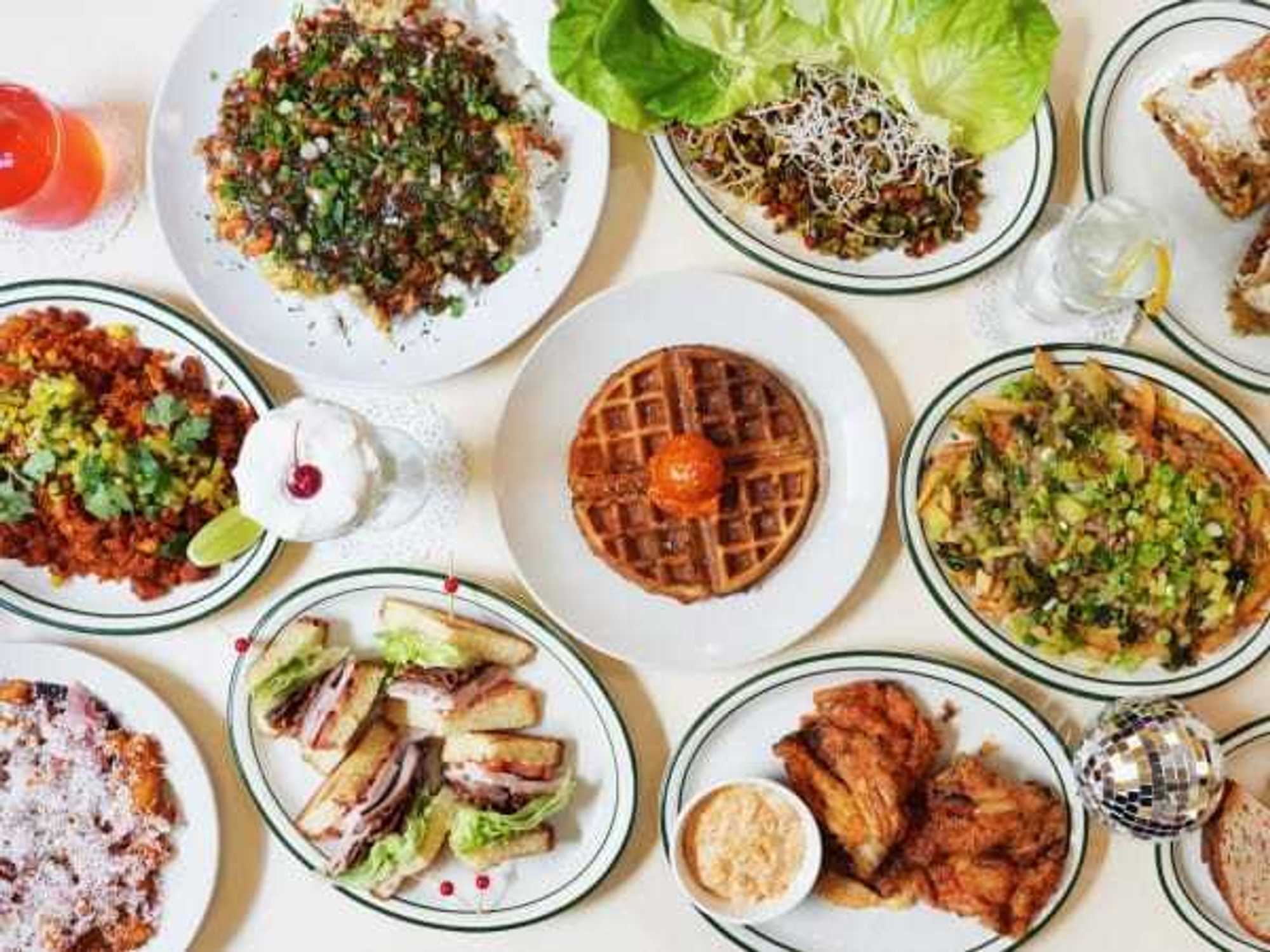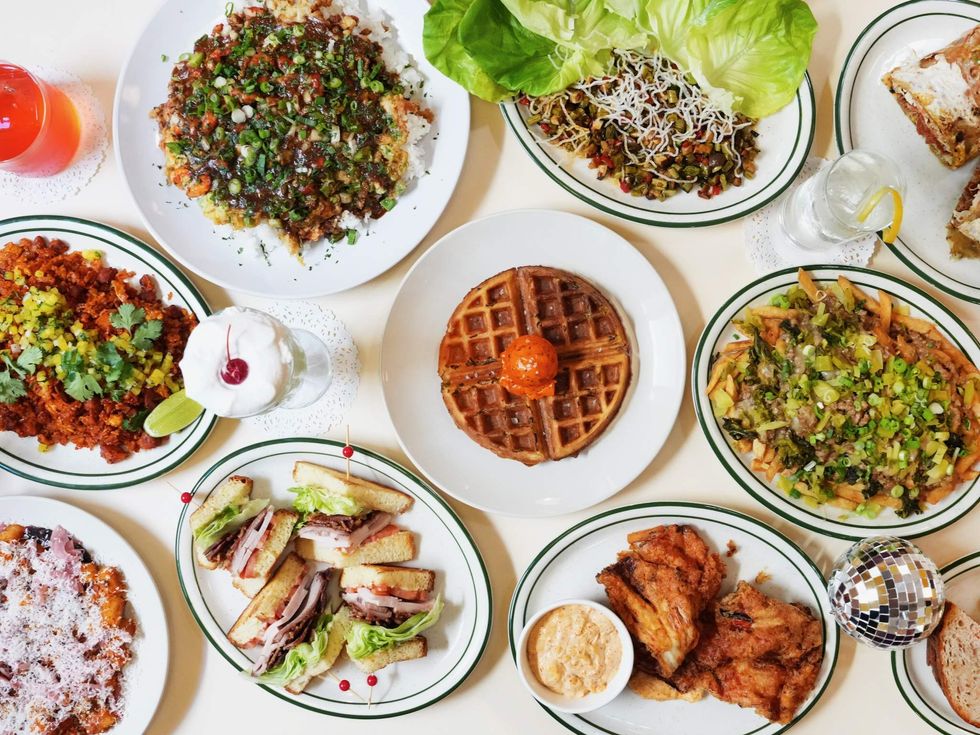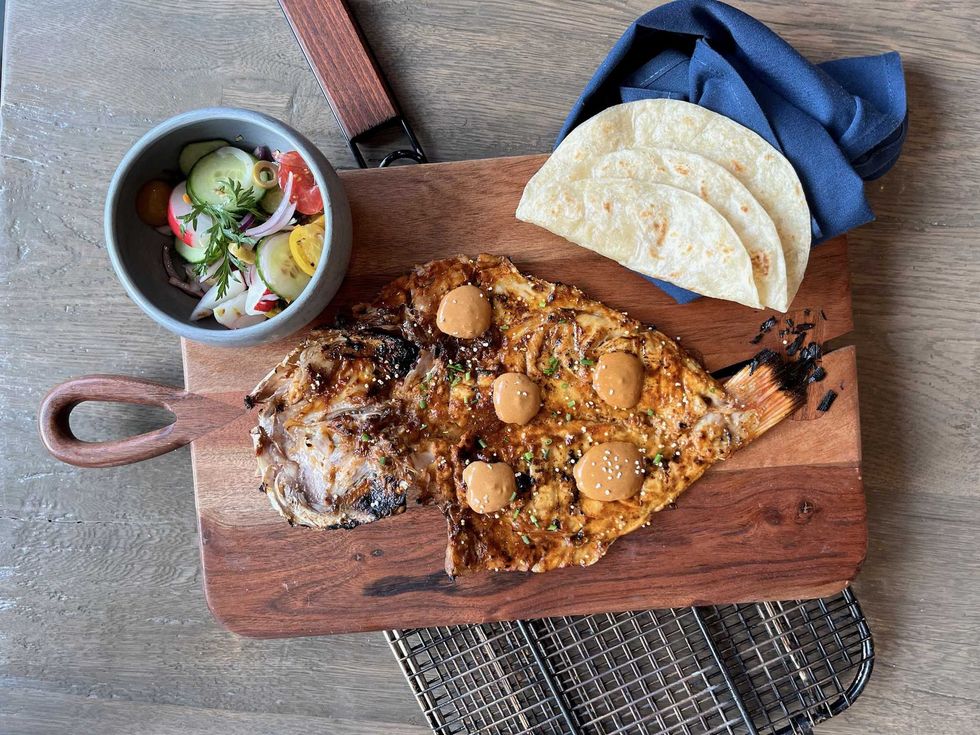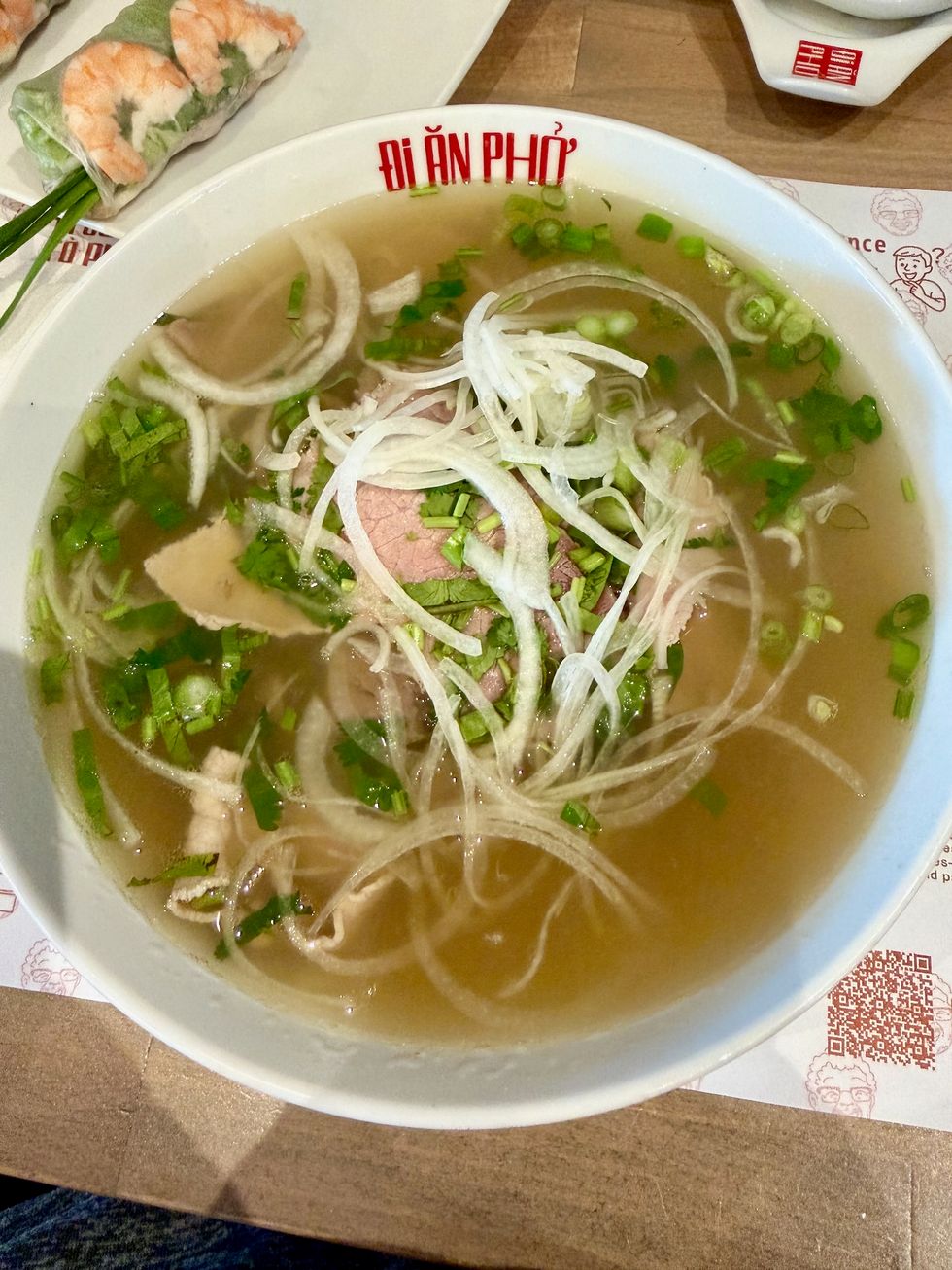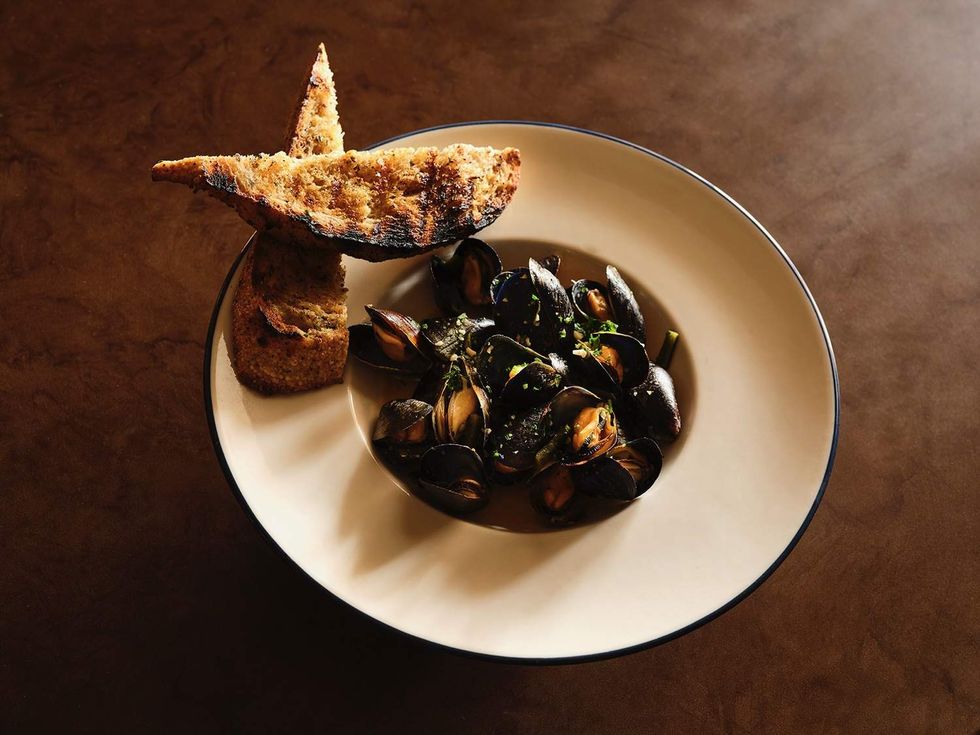Food for Thought
Morning of the Long Knives: A Chef and his Baby
 Chef Michael Dei Maggi working his knife magicPhoto by Gabe Canales
Chef Michael Dei Maggi working his knife magicPhoto by Gabe Canales The tools of the tradePhoto by Gabe Canales
The tools of the tradePhoto by Gabe Canales Cutting your own makes sense from a business perspective as well.Photo by Gabe Canales
Cutting your own makes sense from a business perspective as well.Photo by Gabe Canales He's fast with the knife, even when he's taking it slow for a reporter.Photo by Gabe Canales
He's fast with the knife, even when he's taking it slow for a reporter.Photo by Gabe Canales The buildup to lunch is surprisingly calm.Photo by Gabe Canales
The buildup to lunch is surprisingly calm.Photo by Gabe Canales Do you want your own Misono? And tats?Photo by Gabe Canales
Do you want your own Misono? And tats?Photo by Gabe Canales
Had lunch recently at Caffe Bello with longtime pals Jenny Olin and Dayna Steele (yep, that Dayna Steele).
Chef Michael Dei Maggi came out, probably to see what table was chewing through his whole day’s allotment of pretzel rolls (yes, it was Steele) and the conversation got around to butchering. And how Dei Maggi cuts up whole rabbits and hogs in the kitchen.
Me, who loves to cook but has the knife skills of a 2-year-old, says, “I’d like to see that.”
“You can’t stand the sight of blood,” insists Olin, while Steele gets all excited and says I have to read Julie Powell’s Cleaving before I join Dei Maggi at the butcher block. Cleaving is the second book by the author of Julie & Julia, but the cute little blogger from the experiment to cook all of Julia Child’s recipes is absent from this memoir of learning to be a butcher, a crumbling marriage and obsessive affairs.
“It’s like Eat Pray Love on acid,” Steele says.
Which, I think, is a pretty accurate description. Still, after reading the book, Chef and I make a date for some cutting time.
Dei Maggi rolls into Caffe Bello about 9 or 10 o’clock. Today, he’s dressed in pinstripe slacks and his chef whites, which are, well, almost white. A meat thermometer and pen in his breast pocket, his wallet (which he insists is empty) chained to his pants, reading glasses hooked onto his shirtfront. What you really need to know about him you can tell from his soul patch, leopard spotted clogs and brightly inked tats that run the length of his exposed arms and peak out over his collar.
Yeah, he’s cool. He’s retro. And he has some awesome knives.
“First,” he says, “I line up all my toys.”
He places four very sharp and well used knifes in a line, along with a wicked looking sharpener that he uses repeatedly like a crazed Sweeney Todd sharpening his razor. But the main one he uses is “Baby,” a Japanese Misono, larger than a pairing knife but smaller than a usual chef’s knife with a blade of Swedish virgin carbon steel.
“I’m always losing it,” Dei Maggi says. “I’m always shouting, ‘Where’s my knife!’ "
The kitchen staff knows this knife by sight and they know to immediately return it to him. I imagine them almost bowing as they reverently hand it back to him.
Sadly, today there is no whole hog. But he does have a school of striped bass, a rack of pork and a flock of whole chickens sitting on butcher paper atop the wooden table.
First, he tackles the locally farmed fish, neatly slicing through the shiny scales to create filets for the lunch crowd. He slices up a half dozen or so in about 30 minutes, pulling bones out with needle nosed pliers and tossing the remains into a plastic bucket to be used in fish stock.
“My first job was in a fish plant,” Chef says. “Me and about 100 old Portuguese women. So I know fish. But I’m going slow today because I don’t want to severe a thumb while you’re here.”
Even in slow mode, he’s much faster than I am and he frequently cuts towards himself, which makes me think more than a thumb could be in danger during a dinner rush.
Next up are the young chickens; plucked and beheaded the naked birds are quick work for “Baby.”
Chef halves them neatly and cuts through the joints like slicing through paper. He dumps legs, thighs, wings and breasts into separate containers to be soaked in buttermilk and aromatic spices for two days before he fries them up for the Sunday brunch crowd. Again, the spare parts are kept for chicken stock.
“I was trained this way,” Dei Maggi says. “But I think it’s great so many chefs are starting to buy whole cuts now. When you do your own butchering, you utilize more that way. It makes sense for the quality. All our stocks and sauces are made from scratch, and it makes sense for the bottom line, it’s less expensive. And it’s really fun once you get the hang of it.”
Squeezed into the narrow kitchen at Caffe Bello, making notes, snapping photos and trying to stay out of the way of the hustling staff, I am amazed at the speed and calmness that goes on as the clock ticks down toward the lunch rush. There is the constant loud pounding of veal cutlets, which sounds like a great way to take out your frustrations.
Chef sips on his four shots of espresso over ice (“It keeps me calm.”) while constantly sharpening his “Baby” before cleaning the table with vinegar, salt and lemons. Then it’s on to the rack of Berkshire pork chops.
He’s already frenched the bones with his favorite knife (the only one I’ve seen him use this morning) but now slices cleanly through the rack to create big, plump chops that he expertly wraps in twine and places into a brine.
“I’ll cook one up around 3 this afternoon,” he says. “But likely they’ll stay there overnight to be cooked tomorrow.”
Dei Maggi is both old school, and cutting edge. He says the American gastro culture is disconnected from the daily market and farm. It’s too easy now with fast food, factory farms and Cryovac-ed animal parts shipped around the world. But here in this cramped, bustling kitchen you can see the care and the commitment that goes into the food prep.
Pointing his knife towards the dining room, Chef says, “It’s all about the guy out there who’s parting with his hard earned money. You gotta give him the best you can.”
It’s barely 11 a.m. but already the first table has arrived.
We shake hands and I take my leave. Dei Maggi, on the other hand, faces 12 more grueling hours, punctuated with more caffeine and some cigarette breaks, his only real vices since he doesn’t drink booze (someone alert Anthony Bourdain!)
And what have I learned this morning?
That maybe I need to retire my 8-inch Henckels chef and get my own Misono “Baby.”
Yeah. Right. That’s what will help my carving skills.
